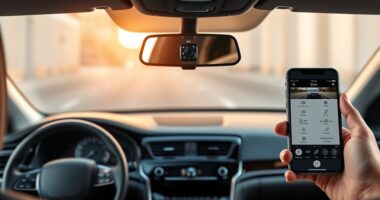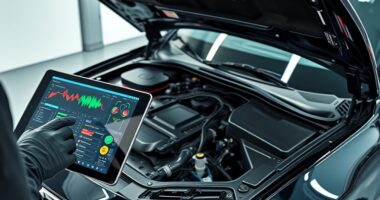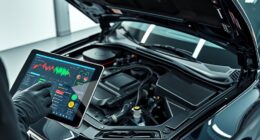Connected cars use IoT technology to make your driving smarter, safer, and more convenient. They connect your vehicle to the internet and related devices, enabling features like real-time data exchange, automatic updates, and proactive maintenance alerts. This integration helps reduce accidents, improve route planning, and enhance overall safety. As these systems evolve, they also protect your data with encryption and security measures. If you want to discover how IoT continues to shape the future of driving, keep exploring.
Key Takeaways
- IoT enables real-time data exchange between vehicles and external sources, enhancing driving decisions.
- Connected cars learn driver habits to optimize routes and improve overall driving experience.
- Over-the-air updates keep vehicle systems current, adding new features and security enhancements.
- Sensors and algorithms allow cars to detect obstacles, adapt speed, and enable autonomous parking.
- IoT integration facilitates predictive maintenance, reducing breakdowns and increasing vehicle safety.

Connected cars are transforming the way you drive by integrating advanced technology that links your vehicle to the internet and other devices. This connectivity enables a range of features that make your driving experience safer, more efficient, and more convenient. One key aspect of this evolution is vehicle automation, which allows your car to perform tasks without constant human input. From adaptive cruise control to lane-keeping assist, these systems work seamlessly to reduce driver fatigue and improve safety. You might find that your car can now detect obstacles, adjust speed, or even park itself, all thanks to the integration of sensors and intelligent algorithms. As these automation features become more sophisticated, they create a smoother, more intuitive driving experience, giving you greater confidence on the road.
Connected cars enhance safety and convenience through automation features like obstacle detection, adaptive speed, and seamless sensor integration.
However, with increased connectivity comes the crucial concern of data security. Your vehicle constantly exchanges information with external sources—be it other vehicles, infrastructure, or cloud servers—and this makes it vulnerable to cyber threats. Protecting your data is essential, not just for privacy but also for safety. Manufacturers are investing heavily in encryption and secure communication protocols to guard against hacking and unauthorized access. You should stay informed about updates and security patches for your vehicle’s software, as these are indispensable in maintaining a safe digital environment. Ensuring strong passwords and being mindful of the data shared through connected apps can help prevent potential breaches. Remember, while vehicle automation offers incredible benefits, it relies heavily on the integrity of your vehicle’s data security measures. Additionally, integrating lifecycle management practices can help extend the security and functionality of your connected vehicle over time.
In addition, the integration of IoT (Internet of Things) makes your vehicle smarter by enabling real-time data exchange. This connectivity allows your car to learn from your habits, optimize routes, and even diagnose issues before they become serious problems. Benefits like over-the-air updates mean your vehicle’s software can be enhanced remotely, keeping it current with the latest features and security improvements. Yet, this constant exchange of data underscores the importance of robust data security practices. You should be proactive in understanding how your vehicle handles your personal information and what steps manufacturers take to safeguard it.
Ultimately, connected cars are shaping a future where vehicle automation and data security go hand in hand. They empower you with smarter, safer driving options while demanding vigilance to protect your digital privacy. Staying informed about the latest developments in IoT technology and cybersecurity ensures that you enjoy the benefits without compromising your safety or privacy. As these vehicles become more integrated into everyday life, your role as a responsible user becomes even more essential in harnessing their full potential.
Frequently Asked Questions
How Secure Are Connected Car Data Transmissions Against Hacking?
You might wonder about the security of your connected car data transmissions, and they can be fairly secure if proper measures are in place. Modern vehicles use encryption protocols to protect data from hackers, making it difficult for unauthorized access. Regular firmware updates are essential, as they fix vulnerabilities and improve security. Staying current with updates guarantees your connected car remains protected against emerging threats and hacking attempts.
What Are the Privacy Implications of Connected Car Data Collection?
Your connected car is like a diary that constantly writes about your whereabouts and habits. The privacy risk lies in how this data is handled; if it’s not properly anonymized, your personal story could be exposed. To protect yourself, look for manufacturers that prioritize data anonymization and require your explicit user consent before collecting sensitive information. Staying informed helps you steer clear of privacy pitfalls on your journey.
How Do Connected Cars Impact Insurance Policies and Premiums?
You might see lower insurance premiums because connected cars enable better risk assessment, allowing insurers to offer insurance discounts for safe driving habits. Your driving data helps insurers understand your risk level more accurately, potentially rewarding cautious drivers. However, keep in mind that this data collection raises privacy concerns, so you should review policies carefully. Ultimately, connected cars can benefit you with personalized rates while prompting you to drive more responsibly.
Are There Standard Regulations Governing Connected Car Technology?
You might worry about safety and consistency, but yes, there are standard regulations governing connected car technology. Regulatory frameworks and automotive standards aim to guarantee safety, interoperability, and security across devices and systems. These guidelines help prevent chaos on the roads and protect your data. While regulations are evolving, they provide a foundation that reassures you your connected vehicle is safe, reliable, and ready for the future of smart driving.
How Reliable Is Iot Connectivity in Remote or Rural Areas?
In remote or rural areas, IoT connectivity can be less reliable due to weaker signal strength and coverage gaps. You might experience intermittent connections or slower data transfer, which can affect your connected car’s performance. To improve reliability, consider upgrading to vehicles with better antenna systems or using additional signal boosters. Keep in mind that coverage gaps are common in less populated regions, so plan your routes accordingly for a smoother driving experience.
Conclusion
Think of connected cars as the nervous system of modern transportation, constantly exchanging information to keep you safe, efficient, and connected. As IoT weaves its way into your vehicle, it transforms your drive into a symphony of seamless communication and smarter decisions. Embracing this technology means steering into the future with confidence, knowing that your car is working behind the scenes like a vigilant co-pilot—making every journey smoother, safer, and more intelligent.









